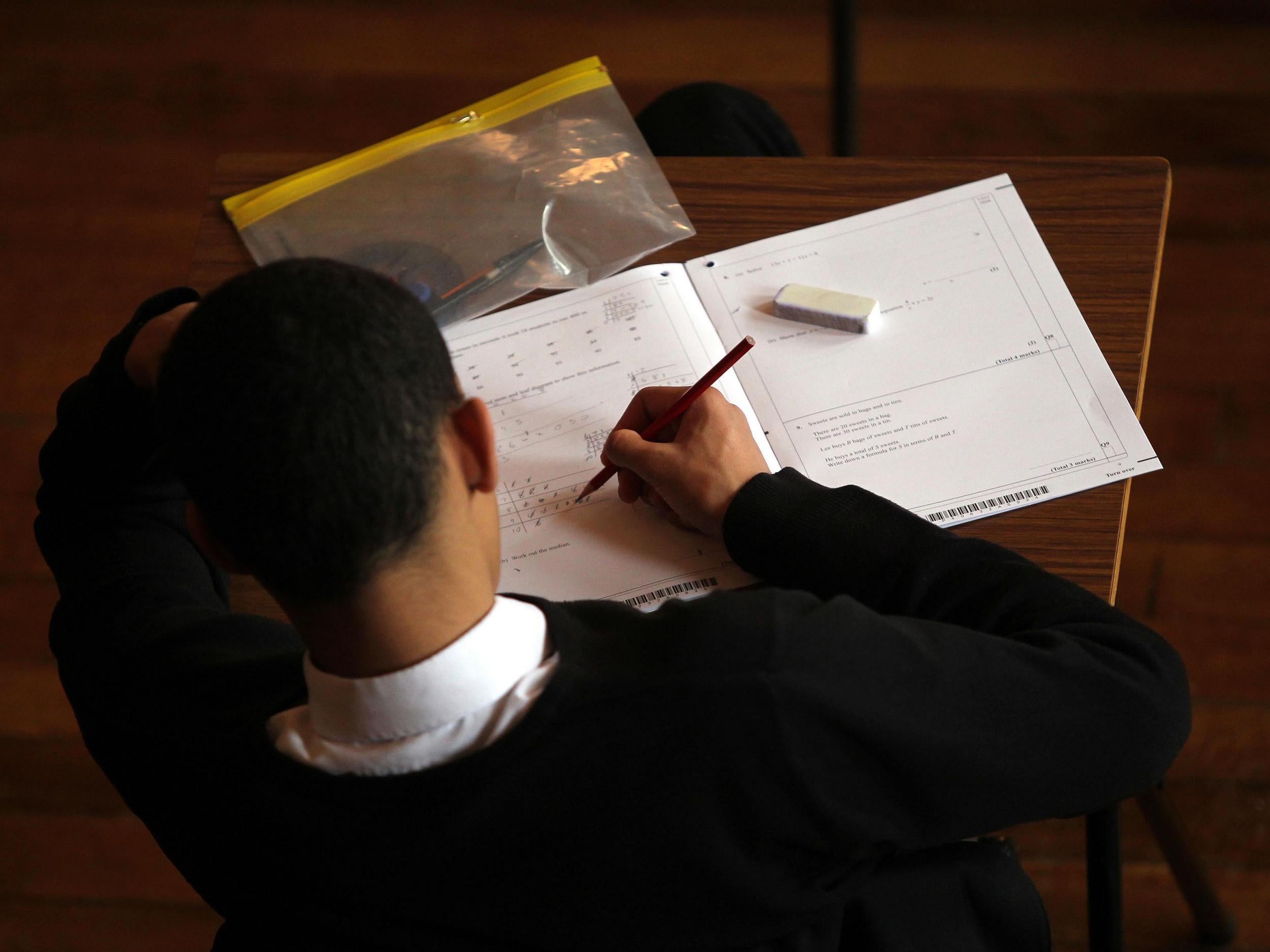GCSE results: Half as many pupils expected to achieve top marks as new grades awarded for first time
Only 50% of students who might have secured an A* in core subjects under old marking system will recieve highest score of nine this time around

Your support helps us to tell the story
From reproductive rights to climate change to Big Tech, The Independent is on the ground when the story is developing. Whether it's investigating the financials of Elon Musk's pro-Trump PAC or producing our latest documentary, 'The A Word', which shines a light on the American women fighting for reproductive rights, we know how important it is to parse out the facts from the messaging.
At such a critical moment in US history, we need reporters on the ground. Your donation allows us to keep sending journalists to speak to both sides of the story.
The Independent is trusted by Americans across the entire political spectrum. And unlike many other quality news outlets, we choose not to lock Americans out of our reporting and analysis with paywalls. We believe quality journalism should be available to everyone, paid for by those who can afford it.
Your support makes all the difference.Just a small percentage of English and maths GCSEs are likely to achieve a nine this summer, as new grades are awarded for the first time.
In total, around 16,100 teenagers are likely to score the very highest mark in maths and 10,700 in English language, out of hundreds of thousands of 16-year-olds in England entering for the two subjects, according to Press Association calculations.
Overall, it is understood that no more than half of those that would have scored an A* in these core subjects under traditional grading last summer will achieve a nine, following the deliberate move to change the system to allow more differentiation, particularly between the brightest candidates.
As teenagers across England, Wales and Northern Ireland were waking up to their results, school leaders warned that GCSE reforms were already causing teenagers more stress and anxiety, and this was likely to increase as more subjects switched to the new system.
Under the biggest shake-up of exams in England for a generation, traditional A* to G grades are being gradually replaced with a nine to one system, with nine being the highest mark.
English and maths - key GCSEs for all teenagers - are the first to move across, with other subjects following over the next two years.
The grading switch is part of wider reforms designed to make GCSEs more rigorous and challenging.
England's exams regulator Ofqual has previously estimated that around 2% of 16-year-old students in England will score a grade 9 in GCSE language, while around 3% of this group will get the top result in maths.
According to a Press Association analysis, using data on the provisional number of entries for Year 11 students in England for these two subjects, this would mean that around 16,129 are likely to get a nine in maths, and around 10,724 will achieve this result in English language.
Last year, 4% of 16-year-olds in England scored an A* in English language, along with 7% in maths.
It means that many teenagers who would have gained this highest possible grade last year will not do so this summer.
This is deliberate, as there are now three top grades - seven, eight and nine - compared to two under the old system - A and A - with A results now split into eights and nines.
Ofqual chief regulator Sally Collier said: “Today's results reflect years of careful planning.
“We have used the same tried and tested principle of comparable outcomes, as in previous years, to ensure that this first cohort of students is not disadvantaged.
“If a student receives a grade seven today, they could have expected to have received a grade A last year.
“And if they get a grade four, they could have expected to get a grade C in 2016.”
Ahead of the results, the Association of School and College Leaders (ASCL) said reformed GCSEs would leave pupils sitting more exams within a six-week summer exams season, which was likely to put them under intense pressure.
ASCL general secretary Geoff Barton, said: “We have already had reports from members of increased stress and anxiety among pupils this year, and this will intensify next year.
“We know from numerous reports that there is a rising tide of mental health issues among young people and we are concerned the new exams will make the situation worse.
“The new GCSEs are more challenging, and there are more papers, and this is putting severe pressure on young people.
“We support a robust qualification system, but it has to be balanced against the welfare of young people, and we are not sure the balance in the new system is correct.”
Schools minister Nick Gibb said: “A new grading system was needed to distinguish between the old and the new reformed GCSEs.
“The new grading system also provides stretch for the highest performers by showing greater distinction between the top marks.”
PA
Join our commenting forum
Join thought-provoking conversations, follow other Independent readers and see their replies
Comments